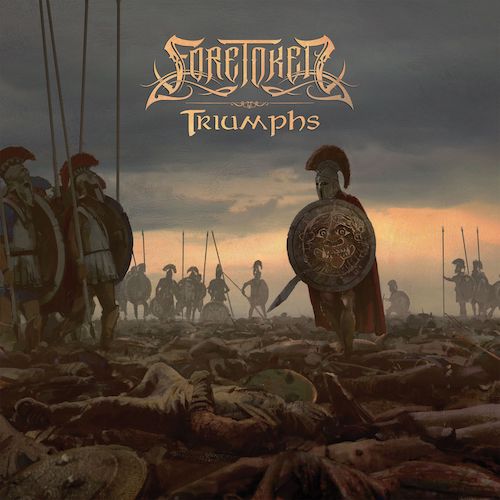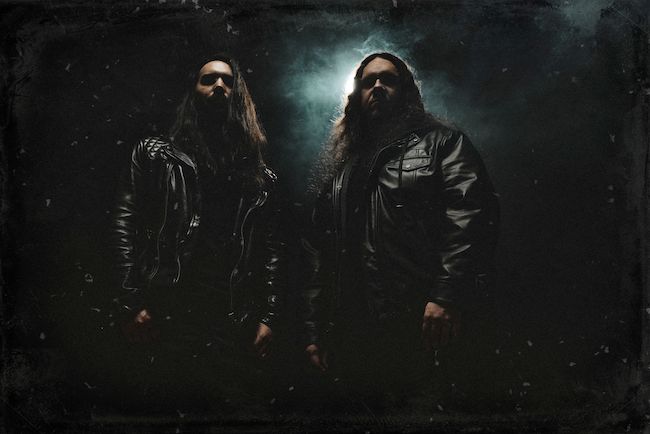Photo credit: Kip Dawkins
Historical and mythological themes have gone hand in hand with heavy metal since the inception of the musical style we hold so dear. From Iron Maiden dedicating Powerslave to ancient Egyptian stories, to Unleashed’s death metal dedication to Norse tales, as well as Melechesh’s blackened approach to Mesopotamian mythology, those are but a few examples of bands from various subgenres who have excelled with these themes at the forefront.
Virginia’s Foretoken have taken the symphonic death metal scene by force with their wide-ranging and meticulous dedication to a cornucopia of mythological themes, even going as far as utilizing native instruments to lend extreme authenticity to the subjects they portray. Not to mention that the two-piece have steadfastly produced riff heavy, grandiose compositions that are both layered in intrinsic detail and viciously assault the listener’s aural senses. Their latest album Triumphs (our review) is a masterclass in songwriting panache and utter brutality.
Lead vocalist and lyricist Dan Cooley spoke with us about the band’s songwriting process, their historical inspirations, hints on what they’re brewing for album number three, how to learn more about the subjects of their songs, amongst a host of other interesting topics.
Dead Rhetoric: Your second album, Triumphs, has been out for a couple of weeks now. The consensus from what we’ve seen has been incredibly positive. How are you feeling about the reception thus far?
Dan Cooley (vocals / lyrics): We’re really happy with the feedback so far! That said, we’re particularly happy with where the feedback is coming from geographically. Foretoken’s lyrics explore global traditions of mythology, so it’s exciting to see metalheads from around the world messaging us and saying they not only dig our music, but appreciate that we’re sharing their culture’s stories.
Dead Rhetoric: The single “Serpent King’s Venom” is not only one of the most unique tracks on the album due to the slowed down pacing and standout riffs, but for its subject of the Persian mythological figure Zahhak. What drew you towards dedicating a song – and a video – towards this particular individual? Also, I absolutely love the bust of Zahhak used in the early parts of the video!
Cooley: Right? The bust is really cool! Concept Artist Taregh Dabash Saber was nice enough to let us use his work for the video. The story of Zahhak the Serpent King was one of the first stories I researched for the album, so I have a particular attachment to it. It’s a classic cautionary tale of how power corrupts. When choosing singles we wanted something which would showcase the variety of tempos, melodies, and riffs on the album. “Serpent King’s Venom” from the start was one of our favorite songs due to its heavy riffs and equally heavy subject matter, so it was an easy decision to pick it as a single.
Dead Rhetoric: Did recording Triumphs in different phases and locations, with guitars recorded at Steve’s (Redmond, guitars/orchestrations) studio, drums at Hannes Grossmann’s own Mordor Sounds studio, vocals at Tony Petrocelly’s Trepan Studios, pose any particular challenges?
Cooley: Recording things remotely is how we did things with our first album Ruin, so things weren’t too dramatically different. Steve can track everything no problem at his studio and Hannes has a great setup at Mordor Sounds. One thing that was different, though, was recording the vocals separately rather than at Steve’s studio. The primary reason for this is I wanted to use a mic other than an SM7B. At Trepan Studios, I was able to use a UA87. I’ve always wanted to record with that mic because it’s excellent in capturing vocal richness and dynamics.
Dead Rhetoric: The mix of the album is an element that really took the music to the next level, allowing every note to shine through. What was it like working with Jacob Hansen again for this process?
Cooley: There wasn’t really much to deliberate on when we decided to choose working with Jacob. Not only is Jacob an amazingly nice guy, he can create these wide sonic landscapes in his mixes that brighten every note and give each song a unique character. With this being our second time working with him, it went a bit smoother because we were aware of his process and what he’d need from us to bring out the best in our performances.

Dead Rhetoric: The cover art for Triumphs was done by Tomas Honz, depicting the aftermath of a brutal battle, with soldiers observing the devastation around them. What was it like working with him on this piece, and could you share what the artwork represents for you?
Cooley: You know, it seems we’ve made a habit of working with people who are not only super nice, but are very professional. We worked with Tomas on our first album, too. For Triumphs, I actually messaged him before a single song was written. We exchanged a few emails and he sent over some drafts, and that was pretty much it. I had an image burned into my brain of a single Greek hoplite leader surrounded by death on the battlefield. We often think about the victory, the victor, the ‘hero’, but not the consequences and collateral damage of the person’s actions. I wanted this sentiment to be upfront and center on the cover.
Dead Rhetoric: Foretoken’s music contains many grandiose arrangements and differing soundscapes. How difficult is it for an idea to develop into a whole song, and how much time does it typically take for a song to take shape?
Cooley: We figured out a fairly good process during the writing of Triumphs, which we’re going to stick to from here on out. Steve will first come up with some riffs and send them over to me with a click track behind them. This guides me as I begin to think about lyrics and vocal patterns. Once Steve has finished the guitars, he’ll add a drum track and send it over to me to finish writing lyrics/vocals. The unique thing we did this time around was add orchestrations after the lyrics were written. This allowed Steve a chance to inject more dynamics and character into the songs, either by looking at the lyrics, or from suggestions I’d give. This process typically takes a few weeks to a month per song.
Dead Rhetoric: Does having two primary members in the band make it easier or more difficult when it comes to composing new music?
Cooley: It makes it easier in my opinion, because we’ve a very clear vision about what we’d like to do. We’ve also been writing music together since 2006, so we can adapt to what each other will write fairly well at this point.
Dead Rhetoric: There was some usage of a few instruments that aren’t all that common in metal music on Triumphs. What were some of your favorites that you used, and are there any specific instruments that you’ve yet to use on a song that you’d like to in the future?
Cooley: We used a hammered dulcimer in “Revenant of Valor,” qanun in “Serpent King’s Venom,” and an erhu and dizi in “Demon Queller.” It’s hard to pick a favorite, because they each have a role in making the respective songs stand out. I do have a list of instruments which we’d like to use! However, I’m going to be secretive and not name any prospective instruments, because that’ll give hints of the stories yet to be told on the next album.
Dead Rhetoric: What draws you to writing about historical and mythological subjects at the core of your music with Foretoken? Any subjects that you’d like to tackle in the future that you haven’t as of yet?
Cooley: Simply put: there’s a massive amount of design space. Mythology at its core is about the human experience, and there are so many topics to cover which are nicely wrapped in theatrical and fantastical stories. Conceptually, the third album is already done, the themes and the stories have been picked out, and it’s going to be exciting for sure. The one hint I’ll share is that thematically, the next album will be more gruesome.
Dead Rhetoric: With Triumphs now being released, what else do you have planned for the rest of 2023 and beyond? A tour perhaps? If live shows are on the agenda, do you have a live lineup in mind and how many additional folks does it take for you to put on a live performance?
Cooley: Right now, we’re trying to put together a full band, as in finding a second guitarist, bassist, and drummer, as we would like to play live. It’s undecided if these individuals will be full-time members or just around for touring. We’ve some folks in mind, but nothing is concrete just yet. Aside from that, we’re beginning to write our third album.
Dead Rhetoric: Do you draw inspiration musically from any of your peers? What does your typical playlist look like?
Cooley: We take inspiration from all sorts of music; not just metal. Steve’s told me that there are times that he’ll literally feel inspired to write immediately after listening to something interesting and new. For example, the intro of “A Tyrant Rises as Titans Fall” was inspired by “The Rains of Castamere” from Game of Thrones. His typical playlist includes lots of Cannibal Corpse, Cryptopsy, At The Gates, Death, Rhapsody of Fire, Dissection, and Candlemass. I’ll typically listen to Opeth (my favorite band), Bloodbath, Hour of Penance, Miseration, Obscura, Aborted, The Crown, and Children of Bodom. I also like synthwave, movie scores, and video game soundtracks, too.
Dead Rhetoric: Switching gears a little; what kind of hobbies do you have outside of music? What’s your go to activity to help you unwind?
Cooley: I know Steve likes hiking and getting out into nature when the weather is nicer. In terms of unwinding, he also likes catching up with friends at a bar over a beer or two. I like to watch tv shows and movies, because it’s not only entertaining, but it helps me think of different ways to retell the various myths, legends, and folklore in our albums. I try to write our lyrics like a movie, so it helps to have inspiration around story structuring. I’ll also play video games, too, when I get the chance.
Dead Rhetoric: Being a lover of history and mythology, are there any films, documentaries, or books that you’d recommend to those who would like to investigate more into the subjects present in your music?
Cooley: Book-wise: “Mythology” by Edith Hamilton, “Best-Loved Folktales of the World” by Joanna Cole, “Myths of the Norsemen” by H.A. Guerber. Film-wise, it seems like the best mythology-inspired movies are horror movies. I particularly enjoyed “Antlers” and “The Hallow.”
Dead Rhetoric: Tell us a little bit about your goals and aspirations for Foretoken within the next couple of years.
Cooley: Outside of writing album number three, we’d like to put together a live act for us to either play shows or tour. A dream for us would be to eventually play a festival, maybe that’ll happen one day.
Dead Rhetoric: Is there anything else that you’d like to add?
Cooley: Thank you for reading this interview, a bigger thank you if you’ve listened to our album, and a massive thank you if you’ve picked up a copy! We’re grateful for all the support we’ve received and it’s amazing to see more and more people join us along the way through our journey of metal and mythology, so thank you!


